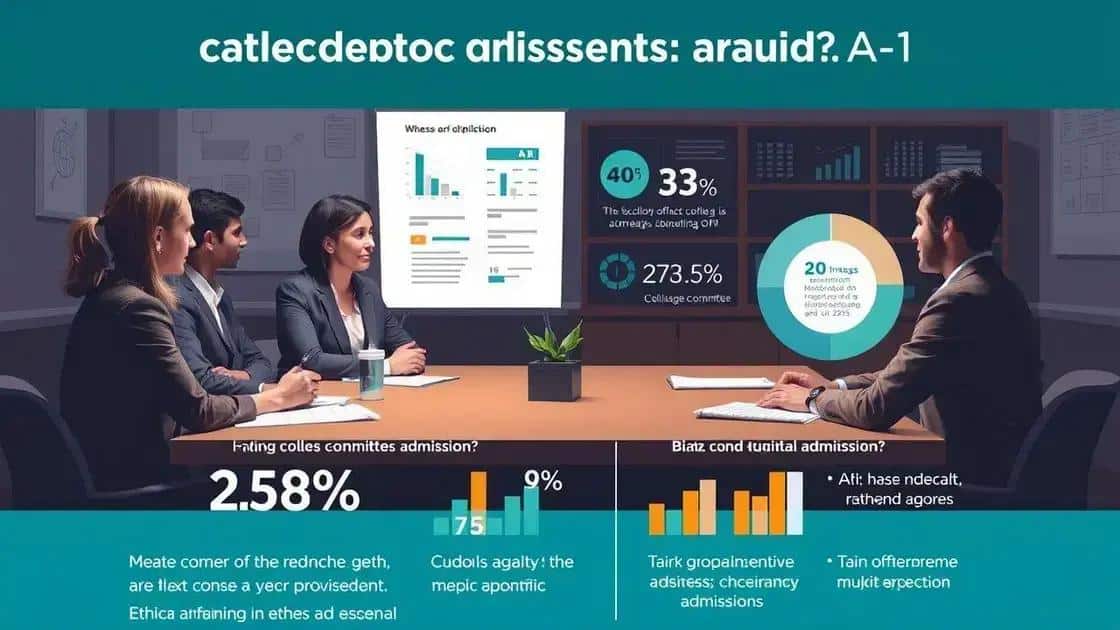College admissions AI trends shaping the future

AI in college admissions enhances personalization and evaluation processes but raises ethical concerns like bias and transparency, requiring careful implementation for fair and equitable outcomes.
College admissions AI trends are changing the landscape for aspiring students. Have you considered how technology is shaping the process? Let’s dive into the fascinating developments!
Understanding the role of AI in college admissions
Understanding the role of AI in college admissions can feel overwhelming, but it’s actually quite fascinating. This technology is helping schools and students navigate the complex process of applying for college.
AI systems analyze vast amounts of data to assist admissions officers in their decisions. This means that students are evaluated more fairly and consistently, as AI can reduce human bias in the selection process. With AI, schools can identify candidates who may excel, even if their transcripts don’t tell the whole story.
How AI is Used in Evaluating Students
Many colleges now use AI tools to analyze applications more efficiently. These tools look for patterns and insights that may not be obvious to humans. They can sort through applications quickly, ensuring that each one gets the attention it deserves.
- Evaluates standardized test scores systematically.
- Identifies unique qualities in students’ essays.
- Considers extracurricular activities and achievements.
Furthermore, AI assists in personalizing the application process for students. For example, it can recommend specific programs or scholarships based on a student’s profile. This means that every applicant gets a tailored experience, increasing their chances of finding a good fit.
As the technology continues to evolve, it also opens up discussions about ethics and fairness. How do we ensure that AI is used responsibly? These are important questions that colleges are considering as they incorporate these tools into their admissions processes.
The Future of AI in College Admissions
Looking ahead, we can expect even more innovation in how colleges use technology. This includes more advanced algorithms that can predict student success based on previous trends. With continuous improvement, AI might become an essential tool in providing equity in college access.
In conclusion, understanding the role of AI in college admissions reveals a world where technology helps create opportunities for students, ensuring that talent is recognized regardless of background or credentials.
How AI enhances student evaluation processes

AI plays a significant role in enhancing student evaluation processes. By utilizing technology, schools can assess student applications more effectively and fairly. This not only helps in identifying top candidates but also in recognizing potential that may be overlooked through traditional methods.
Integrating AI into evaluations allows admissions committees to analyze data with greater precision. Instead of relying solely on grades, AI examines various factors, including personal statements, recommendation letters, and extracurricular activities.
Key Benefits of AI in Student Evaluations
With AI, admissions teams can streamline many steps in the evaluation process. Here are some of the main advantages:
- Simplifies the sorting of applications based on multiple criteria.
- Identifies patterns in students’ achievements and backgrounds.
- Enhances fairness by reducing human bias in evaluations.
By compiling and analyzing data, AI can provide insights into which candidates may thrive in specific programs. This personalized approach not only benefits the institutions but also the students, as they get matched with programs that suit their strengths and interests.
Furthermore, AI can recommend adjustments to an application process based on trends and outcomes. For instance, if data suggests certain qualifications lead to successful student outcomes, colleges can adjust their evaluation criteria accordingly.
The Future of Student Evaluations with AI
As AI technology continues to improve, its influence on how evaluations are conducted will grow deeper. Innovations like natural language processing help AI interpret the context of personal essays, ensuring that all aspects of a student’s application are considered holistically.
In summary, embracing AI in student evaluation processes not only enhances effectiveness but also promotes a more equitable admission landscape. Colleges must remain open to these advancements to better serve future students.
The future of personalized college applications
The future of personalized college applications is bright and filled with possibilities. As technology advances, so do the ways students can express themselves in their applications. This shift toward personalization is set to revolutionize how colleges and universities evaluate prospective students.
With artificial intelligence, colleges can now offer tailored experiences that help students stand out. For example, AI-driven platforms may suggest specific application strategies based on a student’s background and interests.
Emerging Trends in Personalized Applications
Several trends are shaping the future of how applications are submitted and assessed:
- Incorporation of video content to showcase students’ personalities.
- Use of interactive platforms for submitting applications.
- Customized recommendations for extracurriculars based on individual interests.
These trends make the application process more engaging for students. With a greater focus on individual strengths, colleges can better identify unique candidates who bring diverse perspectives to their campuses.
The role of technology does not stop there. Colleges are increasingly using data to predict a student’s future success based on their application materials. This allows admissions teams to select candidates who will thrive in their programs.
Benefits of Personalized College Applications
Personalizing applications not only benefits students but also institutions. Here are some advantages:
- Enhances student engagement during the application process.
- Improves the overall quality of applications received.
- Allows for a more accurate assessment of student potential.
Moreover, this approach creates a more inclusive environment where diverse talents are recognized. With innovations in technology, students from various backgrounds can express their unique stories, helping colleges to see beyond grades and test scores.
In summary, as we look to the future, the move toward personalized college applications promises to create a more equitable admissions landscape, where every student has the opportunity to shine.
Challenges and ethical considerations of AI in admissions

The use of AI in college admissions presents several challenges and ethical considerations. As colleges increasingly rely on technology to evaluate applicants, it is vital to address the potential pitfalls that could arise.
One major concern is the risk of bias in AI algorithms. AI systems learn from existing data, which may reflect societal biases. This means that if the data used to train these systems is flawed, the decisions made by AI might also be skewed, leading to unfair treatment of certain groups of students.
Key Challenges in AI Admissions
Some specific challenges include:
- Lack of transparency in AI decision-making processes.
- Difficulty in ensuring data privacy and security.
- Potential dependency on technology over human judgment.
These challenges raise important questions about how colleges should implement AI in their admissions processes. Institutions must ensure that their AI tools are regularly evaluated for fairness and accuracy. It is crucial to strike a balance between leveraging technology and maintaining the human touch that is often necessary in the admissions process.
Ethical Considerations
Ethically, colleges must consider the implications of their AI choices. They have a responsibility to ensure that every applicant is treated fairly and that their individual stories are not overlooked.
- Ensuring that AI tools do not disadvantage marginalized groups.
- Creating policies to address how data is collected and used.
- Maintaining accountability for decisions made with AI assistance.
In addition, schools should be transparent with applicants about how AI influences their admission decisions. Open communication can help build trust with students and their families. As AI continues to play a prominent role in college admissions, addressing these challenges and ethical considerations will be essential for creating a fair and just system.
FAQ – Questions about AI in College Admissions
How is AI changing the college admissions process?
AI is transforming the college admissions process by personalizing applications and enhancing evaluation methods, allowing institutions to better identify suitable candidates.
What are the main ethical concerns with AI in admissions?
Key ethical concerns include potential biases in AI algorithms, the need for transparency, and ensuring that all applicants are treated fairly regardless of their background.
Can AI help in reducing bias during admissions?
Yes, when implemented correctly, AI can minimize human bias by providing data-driven insights that focus on candidates’ qualities rather than subjective human judgments.
What role does transparency play in AI admissions?
Transparency is crucial as it helps build trust between students and institutions, ensuring applicants are informed about how AI is utilized in the admissions process.





